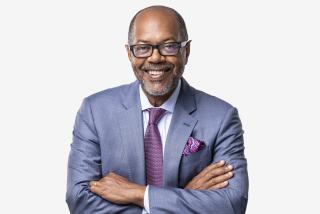Tribune CEO Randy Michaels will resign this week, sources say
- Share via
Reporting from Chicago — Randy Michaels, Tribune Co.’s embattled chief executive, has decided to resign his post at the Chicago-based media company and intends to leave the company before the end of the week, sources close to the situation said.
He will be replaced by a four-member office of the president that the sources said would comprise Eddy Hartenstein, chief executive and publisher of the Los Angeles Times Media Group; Tony Hunter, president and publisher of the Chicago Tribune Media Group; Nils Larsen, Tribune’s chief investment officer; and Don Liebentritt, chief restructuring officer.
The development comes after weeks of turmoil at the bankrupt company, brought on by assertions that Michaels and his management team displayed boorish behavior and fostered a sexist, hostile work environment. The Tribune board met Tuesday, but no announcement on Michaels’ fate followed.
A spokesman for Tribune, which owns the Los Angeles Times, Chicago Tribune, KTLA-TV Channel 5 and other media assets, would not comment on Michaels’ planned departure or the proposed succession plan. Michaels and the other executives involved did not return calls and e-mails seeking comment.
The sources said Michaels had willingly decided to make his exit, having concluded that it was best for the company under the circumstances. He and the board had determined that the turmoil was distracting employees, threatening to hurt business and complicating the company’s efforts to emerge from a contentious bankruptcy process.
Upon Michaels’ departure, stabilizing the situation would fall to the new office of the president, which sources said would be occupied by the heads of Tribune Co.’s two largest business units, the executive in charge of the Chapter 11 restructuring and Larsen, who helped structure real estate billionaire Sam Zell’s leveraged buyout of the company in 2007.
Michaels’ departure followed a report in the New York Times this month that colored the company as a sexist “frat house” increasingly populated with former Michaels associates from the radio industry.
That perception seemed to be confirmed several days later when Lee Abrams, whom Michaels handpicked as his chief innovation officer, sent all employees an e-mail containing a link to a video of a newscast parody with nudity and profanity.
For the board, these events dialed up the pressure to exercise its fiduciary duty to protect the company’s credibility and employees, sources said. Board members were especially sensitive to the legal issues, given that they had already become potential targets of litigation in the tangled bankruptcy case.
Michaels, who enjoyed a successful but controversial career in radio, has struggled to fight the perception that his corporate culture had a crude element to it. His denials, however, seemed to embolden some critics.
During his time as head of the company, office birthday parties were especially raucous, several employees said. Michaels and other executives — some of whom were colleagues from his years in radio — tended to congregate and trade ribald jokes and stories.
The antics sometimes leaked outside the building. Several times earlier this year, Michaels and others gathered in the executive offices with laser pointers, shining them out the window and laughing loudly enough to be heard down the hall as they targeted pedestrians and an office building. Twice, Tribune Co. security received complaints that the lights were bothering occupants.
“It’s immature,” one source said. “It’s not what I want my CEO doing, not how I want him running the company.”
More seriously, several women complained they were the target of lewd comments and actions.
Hartenstein, 59, who will be one of the four sharing the office of the president when Michaels leaves, became publisher and chief executive of the Los Angeles Times in August 2008.
During a lengthy career at Hughes Electronics Corp., a defense contractor and satellite maker later acquired by General Motors Corp., he pushed the idea of using satellite technology to beam television programming directly into the homes of consumers.
Hartenstein convinced his bosses at GM to finance what eventually would become DirecTV Group Inc. He was with DirecTV, first as its president and then chief executive, from its inception in 1994 until 2004, after GM sold its stake in the company to Rupert Murdoch’s News Corp.
Hartenstein is on the boards of Broadcom Corp., SanDisk Corp., Sirius XM Radio Inc. and the City of Hope hospital in Duarte.
Times staff writer Walter Hamilton contributed to this report.
More to Read
The biggest entertainment stories
Get our big stories about Hollywood, film, television, music, arts, culture and more right in your inbox as soon as they publish.
You may occasionally receive promotional content from the Los Angeles Times.










